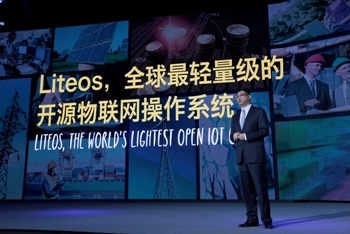  Huawei, on Wednesday announced the launch of its Agile Network 3.0 Architecture at the Huawei Network Congress 2015, in Beijing themed “From Agility to Imagination”. Highlighting the latest version of Huawei’s Agile Network architecture, Huawei introduced its Agile Internet of Things (IoT) solution which enables enterprises to build an agile IoT infrastructure to capture infinite business possibilities and realize the digitization of production, manufacturing and logistics.
Huawei predicts that by 2025, a total of 100 billion connections will be generated globally and two million new sensors will be deployed every hour. However, our networks today cannot provide the connectivity to support this. As part of HNC2015, Huawei will also launch its Agile IoT Solution, which consists of three core components: Agile IoT gateway, Agile Controller and LiteOS, a lightweight IoT operating system (OS).
“Huawei believes that standardizing ICT infrastructure will foster the development of Internet applications, including IoT applications. To address this, Huawei is launching our Internet of Things operating system, LiteOS,” said William Xu, Chief Strategy and Marketing Officer, Huawei, at the congress.
LiteOS is the world’s most lightweight IoT OS. It is small in size at 10KB and requires zero configuration while supporting auto-discovery, and auto-networking. It can be widely applied to different areas including smart homes, wearables, connected vehicles and across industries. The LiteOS helps to simplify the development of smart hardware to enhance IoT connectivity. In addition, Huawei announced that LiteOS will be opened to all developers, enabling them to quickly develop their own IoT products.
In addition to focusing on developing IoT infrastructure products and solutions, Huawei is also committed to establishing an industry application-oriented IoT ecosystem through collaborating with upstream and downstream partners and developing industry solutions. This is part of Huawei’s approach to develop and provide Business-driven ICT Infrastructure (BDII).
“BDII requires close business collaboration and joint innovation efforts between Huawei and our partners. We have been involved in industry alliances, working with standard organizations in the area of IoT, and establishing innovative research centers, open labs, and development communities to foster industry development,” said Yan Lida, President, Enterprise Business Group, Huawei.
“Over the last three years, Huawei has been involved in a number of in-depth technological collaborations with our global industry partners in IoT. We have developed a series of IoT solutions that have already been applied to buildings, electricity meters, vehicles, gymnasiums, factories, retail outlets, and street lights. In line with our approach to provide BDII, Huawei will continue to work with more partners to launch solutions based on our Agile Network architecture for different vertical industries,” said Liu Shaowei, President, Switch and Enterprise Communication Product Line, Huawei.
In addition to the Agile IoT solution, Huawei also released a number of new products and technologies in the areas of data centers, enterprise wireless campus, Wide Area Network (WAN) and network security. These products include the 100T data center switches, the Wi-Fi and LTE Integration Access Agile Mobile Solution, high throughput routers with enhanced transmission efficiency, and the Device, Network, Cloud End-to-end Security solution.
HNC2015 is a major industry event that brings together more than 6,000 of customers, channel partners, journalists, analysts, and others from more than 43 countries around the globe and 41 exhibitors including Intel, SAP, IBM, VMware, Infosys and China Telecom. As part of the event, Huawei will host approximately 200 forums and speeches, covering seven technical themes and eight industry themes, to explore the future of network construction and agile businesses in the IoT era. |